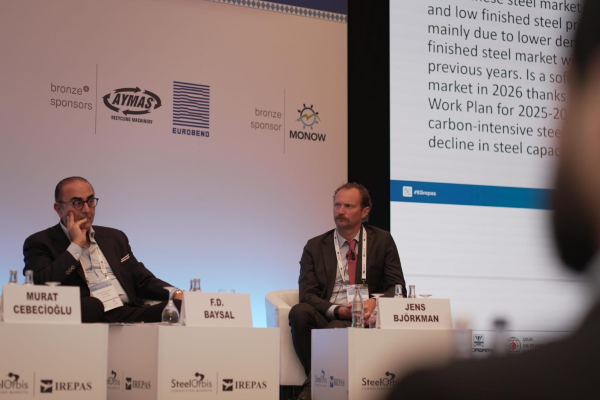Speaking during the panel session on the last day of the SteelOrbis 2025 Fall Conference & 93rd IREPAS Meeting held in Munich on September 28-30, Jens Björkman from Stena Metal International and also the chairman of the raw material suppliers committee, summarized the findings of the committee meeting regarding the general situation in the global steel and raw material markets, highlighting the challenges facing trade, demand and investment.

Mr. Björkman noted that, in the recent period, global trade conditions have been extremely difficult, describing the situation as “devastating” amid the current uncertainty. Pointing out that trade barriers and uncertainties continue to weigh heavily on the market, particularly with the US tariffs forcing some countries to find alternative destinations, he added that this shift has created pressure on other markets, including Turkey. Regarding the protectionism in the market, he stated that there are rumors that the EU will impose some duties on Asian materials due to the huge inflows of cheaper steel from the region. Meanwhile, noting that China, which is the main exporter of cheap steel, has signaled plans to reduce steel production and exports in 2025 and 2026, albeit the actual outcome remains uncertain, he said that, in the longer term, larger investments in EAF-based production are expected, supported by stable electricity supply and growing domestic scrap availability. China has also announced a cut of about 90 million metric tons in its steel production in 2025.
Highlighting that the planned green transition in the steel industry is increasingly being questioned, with many investments being cancelled and projects being delayed, Mr. Björkman stated that the EU’s move toward electric furnace-based production has now been postponed by at least three to four years. He underlined that, if carbon emission trading in Europe and the related pricing system are fully implemented, emission reduction technologies will need to be installed more widely. However, he said that, instead of hydrogen-based DRI, natural gas could be used in the short term. In addition, the raw materials committee chairman said EU waste shipment regulations treating scrap as waste will create more bureaucracy, especially for non-OECD countries needing formal approvals to buy European scrap, while OECD trade remains unaffected. Regarding the concerns over domestic scrap oversupply, he stated that Europe already faces excess supply overall, but certain grades like clean automotive scrap could face shortages. This imbalance, he explained, is why EU steel producers push to keep scrap within Europe.
Looking at Turkey, Björkman noted that the recent increase in freight costs has become a burden for suppliers, leading prices to increase slightly in Turkey, though how long this situation will last remains difficult to predict. Regarding the changes in Turkey’s inward processing regime, the committee chairman stated that Turkish mills, who are already struggling amid high costs, may become less competitive in the short term as scrap prices may increase slightly, leading the mills to reduce production.
Meanwhile, stating that raw material demand in the GCC market is expected to focus more on DRI/HBI, which remains limited in supply, he emphasized that larger volumes will be needed in Europe to support flat steel production and the green transition, though a mix of DRI/HBI and scrap is likely to be used.